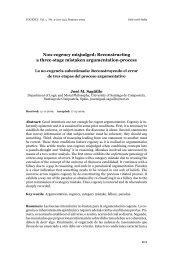Cogency v2 n2
Cogency v2 n2
Cogency v2 n2
You also want an ePaper? Increase the reach of your titles
YUMPU automatically turns print PDFs into web optimized ePapers that Google loves.
Wittgenstein and the Logic of Deep Disagreement / D. M. GODDEN & W. H. BRENNER<br />
5.3. A Wittgenstenian Pessimism?<br />
Given that deep disagreements are disagreements across language games,<br />
our position is that the optimism of Fogelin’s respondents is largely misplaced<br />
– at least, on a Wittgenstenian view of the issue – because each variously<br />
mischaracterizes the nature of deep disagreement or the nature of<br />
reason, thereby misrepresenting reason’s role and potential in resolving such<br />
disputes.<br />
To begin, consider Memedi’s proposal to normalize deep disagreements<br />
by introducing a “third party” rational arbiter. 4 Recall though, that by definition<br />
deep disagreements are ones whose irresolvability is not due to the<br />
ignorance or intransigence of their disputants. As such, adding an impartial<br />
interlocutor cannot provide resolution-resources not already available to<br />
the initial disputants. At best, the third-party might be conversant in the<br />
different language-games involved in the deep disagreement, thereby possibly<br />
adding a degree of understanding not initially present. Yet since the<br />
irresolvability of disagreements is due to the language-games in which they<br />
occur and not the language-users engaged in them, this added understanding<br />
could only help to clarify the nature of the disagreement, rather than<br />
indicate or prescribe its resolution.<br />
Similarly, there is a problem with Feldman’s construal of deep disagreements<br />
as differences of opinion about framework propositions which treats<br />
a difference in measure (concept determination) as though it were a disagreement<br />
in measurement (concept application) when in fact their logical,<br />
and therefore rational, character is of a different order. On Feldman’s view,<br />
in “turning our spade” we loose some single stone – the framework proposition<br />
at issue – from the “sedimentary layer of the unchallenged” and displace<br />
it into the shifting sands or even “the river of thought” itself, realizing<br />
that it is not “intrinsically” fixed (cf. OC §§ 96, 97, 99). (For Wittgenstein no<br />
proposition is beyond assessment intrinsically, but only insofar as it is functioning<br />
foundationally.) While surely this ‘loosing of some single stone of<br />
the logical grammar’ occurs , and is part of the ordinary development of<br />
4<br />
For a further commentary on Memedi’s proposal see Campolo (2007).<br />
53








